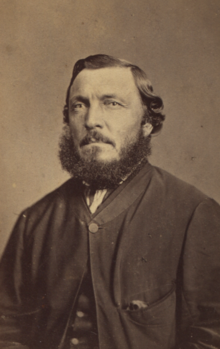William Shakespeare Hall
William Shakespeare Hall (1825–1895) was a pioneer settler of the Swan River Colony and a well-known J.P., explorer, pastoralist, and pearler.
He was born in London to Henry Edward and Sarah Theodosia. When the family sold Shackerstone Manor he emigrated with his parents and five siblings to Western Australia. They arrived in Fremantle in February 1830 on board the Protector.
The family received two land grants—of 16,594 acres (6,715 ha) and 200 acres (81 ha)—at Mandurah and the locality of Hall's Head is named after them, though their attempt at developing the land was a failure. They built a house, Halls Cottage, on the smaller parcel of land and as of 2014 this was believed to be the only extant settler's building in the Mandurah area. While in the Murray district, Hall became known for building relationships with the local indigenous people, including learning their language, a characteristic that would later be instilled in his son Aubrey.
In 1835 it became apparent that the land around Mandurah was not suitable for the type of farming that they wished to undertake, so the large-holding was sold and the family moved to Perth in 1836 where Hall attended John Burdett Wittenoom's nascent grammar school. At this point his father returned to England to sell the family estate at Shackerstone, returning with Hall's elder brother. Farmland was then purchased at Wongong, to the east of Fremantle, and Hall lived here and farmed until 1852, when at the age of 27 he went to the Victorian goldfields.
He returned to Western Australia eight years later, and soon after and joined Francis Thomas Gregory's expedition exploring the north-west in 1861. After this he returned to Wongong, but before long left again: in 1863 he took up the first sheep station, John Wellard'sAndover, in the Roebourne district. Here, he again demonstrated cordial relations with the indigenous people, notably 'King Mulangom'. He remained there as manager of the station for two years, before returning to Perth. But again he didn't stay long, as he was offered the position of manager of the Roebuck Bay Company, and so moved north to that location. Here he was appointed to be the government's Justice of the Peace for that region. The Roebuck Bay settlement not being a success, the whole company moved to Roebourne and the port of Cossack. Hall resigned his justice-ship in 1867, but his letter of resignation went down when the ship Emma was wrecked and it is not known if he ever rectified this.
...
Wikipedia

